Analysis of a Case Study: Professional Accountability in Nursing, NSW
VerifiedAdded on 2023/01/17
|9
|2901
|24
Essay
AI Summary
This essay presents a detailed analysis of a case study involving a registered nurse whose actions led to adverse patient outcomes, resulting in the cancellation of her registration. The case, drawn from the NSW Nurses and Midwives' Board, centers on a nurse who administered an alternative chemotherapy treatment to her brother, a cancer patient, without proper medical consent or supervision. The essay examines the nurse's actions and omissions, highlighting breaches of the nursing code of conduct and NMBA standards, including informed decision-making and patient safety. It explores the contributions of both human-based and system-based errors to the adverse outcome, and the role of the Health Care Complaints Commission (HCCC) and the New South Wales Civil and Administrative Tribunal in the case. The paper discusses the actions the nurse should have taken to prevent the patient's death, emphasizing adherence to ethical guidelines, supervisor consultation, and prioritizing patient health. Additionally, it considers factors like delegation and the AHPRA's registration requirements. The essay concludes by emphasizing the importance of professional accountability, adherence to nursing standards, and the impact of these factors on patient care and outcomes.
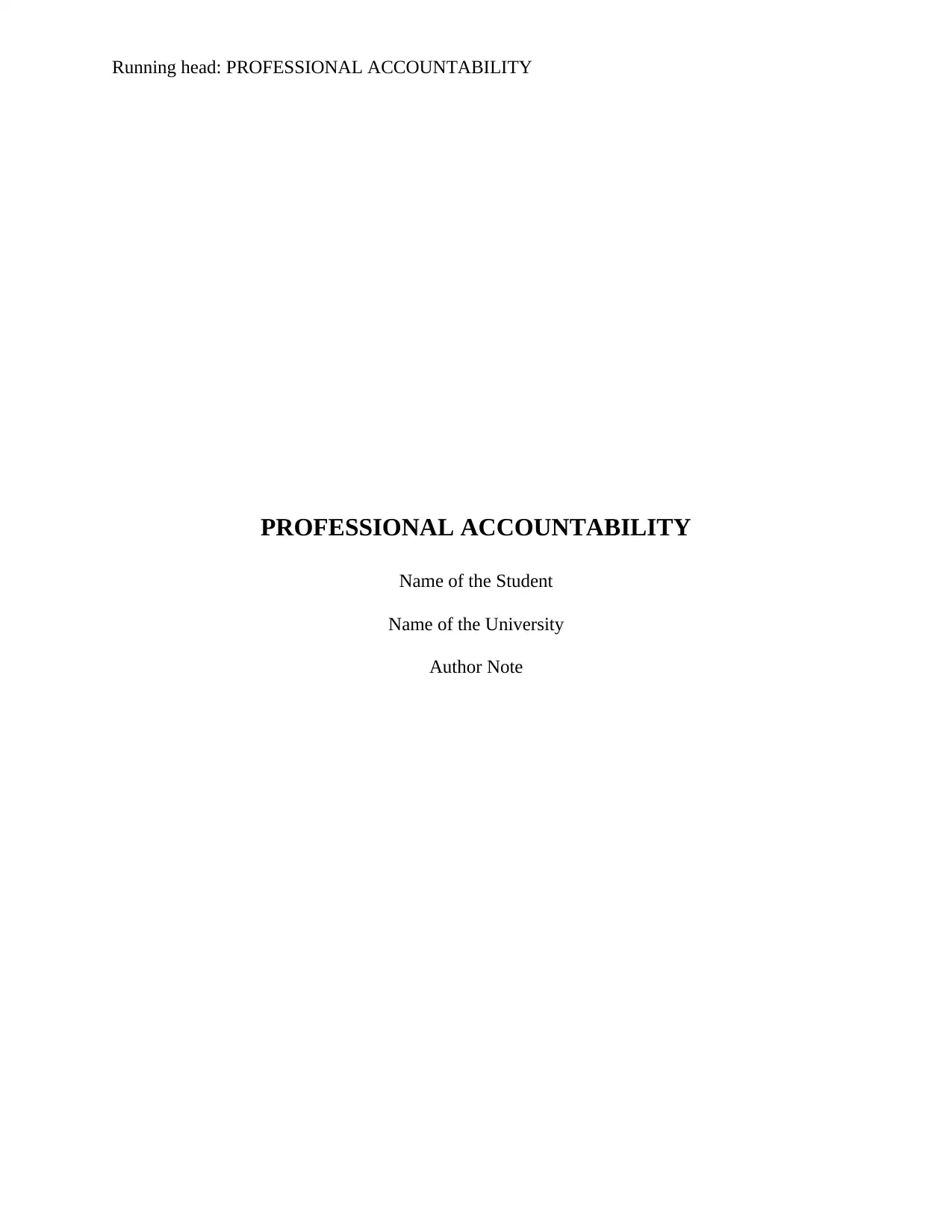
Running head: PROFESSIONAL ACCOUNTABILITY
PROFESSIONAL ACCOUNTABILITY
Name of the Student
Name of the University
Author Note
PROFESSIONAL ACCOUNTABILITY
Name of the Student
Name of the University
Author Note
Paraphrase This Document
Need a fresh take? Get an instant paraphrase of this document with our AI Paraphraser
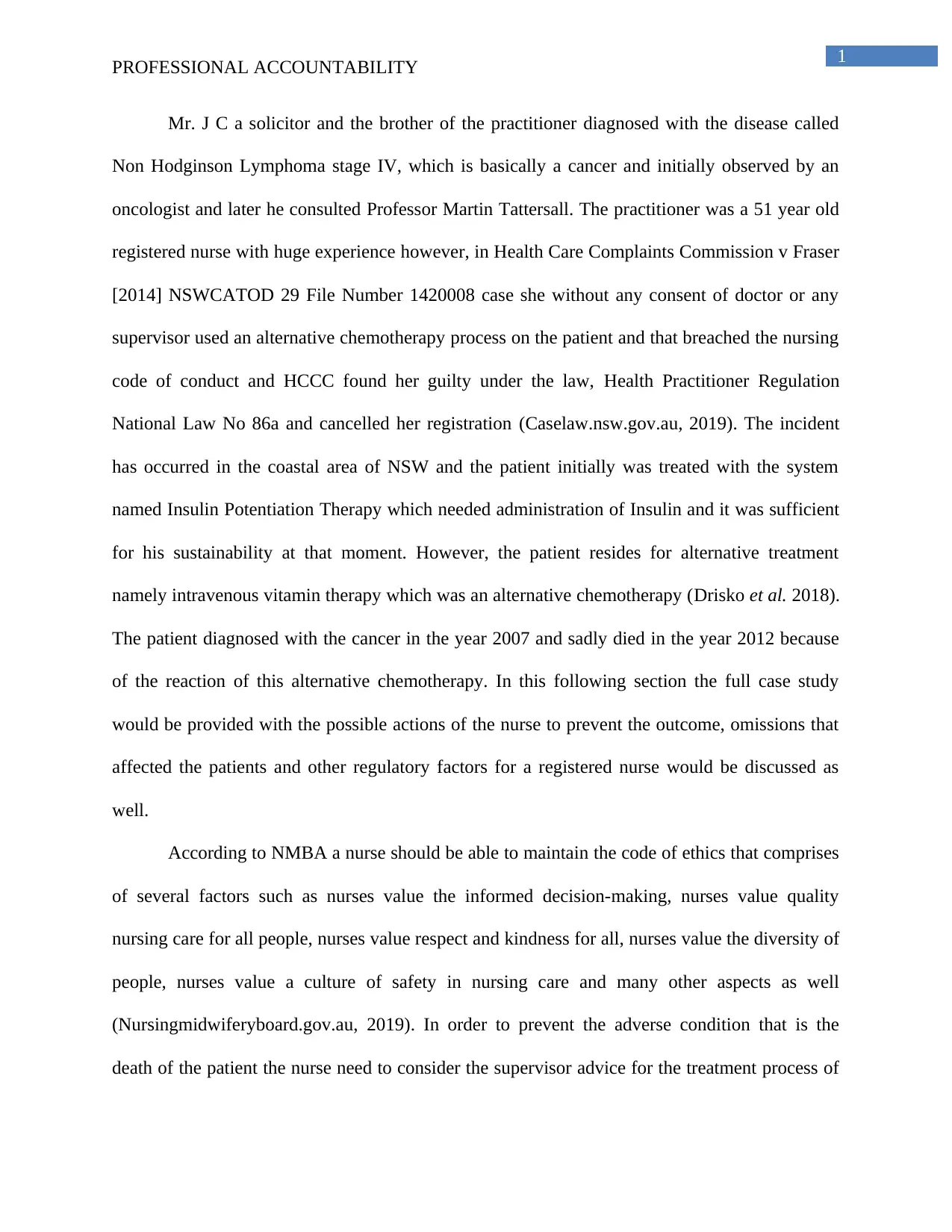
1
PROFESSIONAL ACCOUNTABILITY
Mr. J C a solicitor and the brother of the practitioner diagnosed with the disease called
Non Hodginson Lymphoma stage IV, which is basically a cancer and initially observed by an
oncologist and later he consulted Professor Martin Tattersall. The practitioner was a 51 year old
registered nurse with huge experience however, in Health Care Complaints Commission v Fraser
[2014] NSWCATOD 29 File Number 1420008 case she without any consent of doctor or any
supervisor used an alternative chemotherapy process on the patient and that breached the nursing
code of conduct and HCCC found her guilty under the law, Health Practitioner Regulation
National Law No 86a and cancelled her registration (Caselaw.nsw.gov.au, 2019). The incident
has occurred in the coastal area of NSW and the patient initially was treated with the system
named Insulin Potentiation Therapy which needed administration of Insulin and it was sufficient
for his sustainability at that moment. However, the patient resides for alternative treatment
namely intravenous vitamin therapy which was an alternative chemotherapy (Drisko et al. 2018).
The patient diagnosed with the cancer in the year 2007 and sadly died in the year 2012 because
of the reaction of this alternative chemotherapy. In this following section the full case study
would be provided with the possible actions of the nurse to prevent the outcome, omissions that
affected the patients and other regulatory factors for a registered nurse would be discussed as
well.
According to NMBA a nurse should be able to maintain the code of ethics that comprises
of several factors such as nurses value the informed decision-making, nurses value quality
nursing care for all people, nurses value respect and kindness for all, nurses value the diversity of
people, nurses value a culture of safety in nursing care and many other aspects as well
(Nursingmidwiferyboard.gov.au, 2019). In order to prevent the adverse condition that is the
death of the patient the nurse need to consider the supervisor advice for the treatment process of
PROFESSIONAL ACCOUNTABILITY
Mr. J C a solicitor and the brother of the practitioner diagnosed with the disease called
Non Hodginson Lymphoma stage IV, which is basically a cancer and initially observed by an
oncologist and later he consulted Professor Martin Tattersall. The practitioner was a 51 year old
registered nurse with huge experience however, in Health Care Complaints Commission v Fraser
[2014] NSWCATOD 29 File Number 1420008 case she without any consent of doctor or any
supervisor used an alternative chemotherapy process on the patient and that breached the nursing
code of conduct and HCCC found her guilty under the law, Health Practitioner Regulation
National Law No 86a and cancelled her registration (Caselaw.nsw.gov.au, 2019). The incident
has occurred in the coastal area of NSW and the patient initially was treated with the system
named Insulin Potentiation Therapy which needed administration of Insulin and it was sufficient
for his sustainability at that moment. However, the patient resides for alternative treatment
namely intravenous vitamin therapy which was an alternative chemotherapy (Drisko et al. 2018).
The patient diagnosed with the cancer in the year 2007 and sadly died in the year 2012 because
of the reaction of this alternative chemotherapy. In this following section the full case study
would be provided with the possible actions of the nurse to prevent the outcome, omissions that
affected the patients and other regulatory factors for a registered nurse would be discussed as
well.
According to NMBA a nurse should be able to maintain the code of ethics that comprises
of several factors such as nurses value the informed decision-making, nurses value quality
nursing care for all people, nurses value respect and kindness for all, nurses value the diversity of
people, nurses value a culture of safety in nursing care and many other aspects as well
(Nursingmidwiferyboard.gov.au, 2019). In order to prevent the adverse condition that is the
death of the patient the nurse need to consider the supervisor advice for the treatment process of
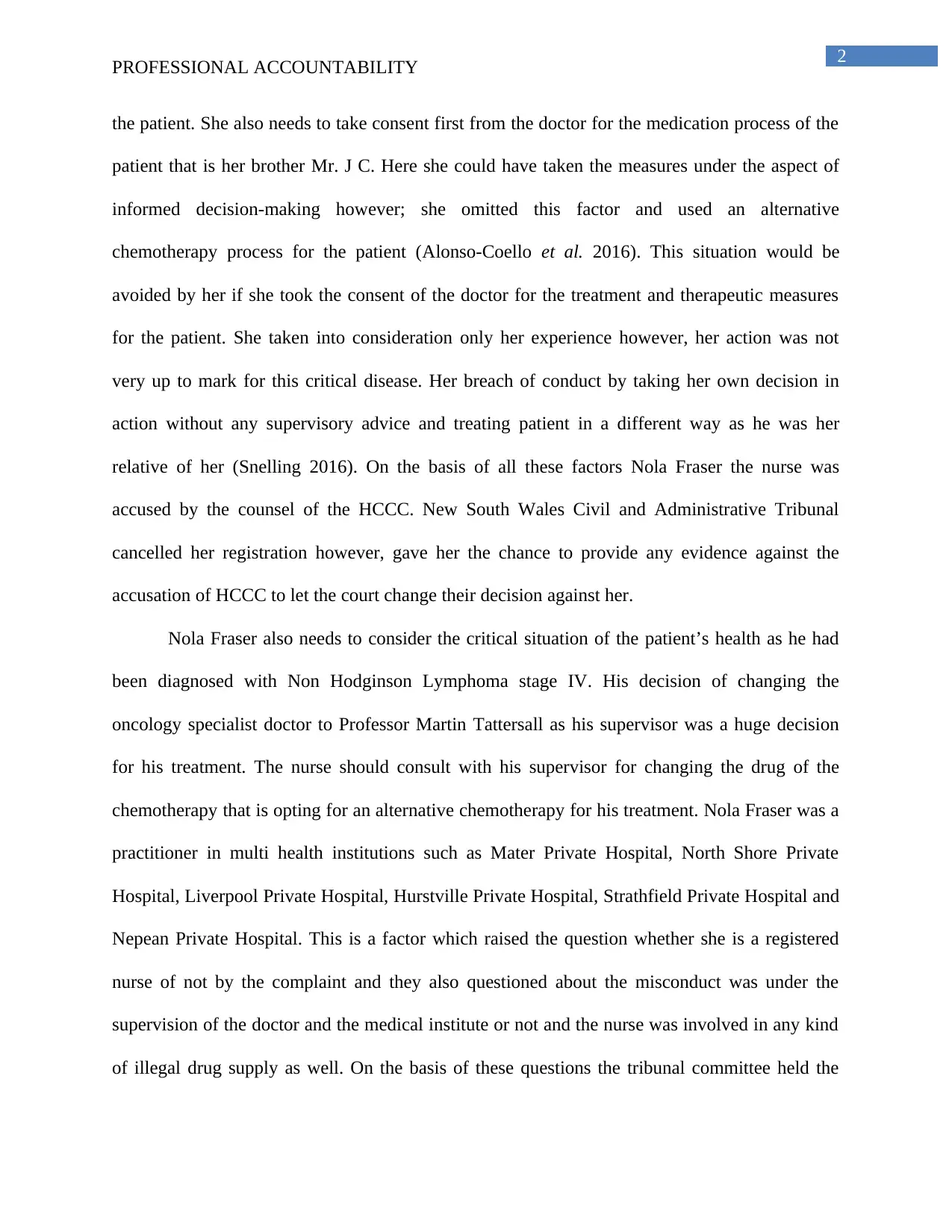
2
PROFESSIONAL ACCOUNTABILITY
the patient. She also needs to take consent first from the doctor for the medication process of the
patient that is her brother Mr. J C. Here she could have taken the measures under the aspect of
informed decision-making however; she omitted this factor and used an alternative
chemotherapy process for the patient (Alonso-Coello et al. 2016). This situation would be
avoided by her if she took the consent of the doctor for the treatment and therapeutic measures
for the patient. She taken into consideration only her experience however, her action was not
very up to mark for this critical disease. Her breach of conduct by taking her own decision in
action without any supervisory advice and treating patient in a different way as he was her
relative of her (Snelling 2016). On the basis of all these factors Nola Fraser the nurse was
accused by the counsel of the HCCC. New South Wales Civil and Administrative Tribunal
cancelled her registration however, gave her the chance to provide any evidence against the
accusation of HCCC to let the court change their decision against her.
Nola Fraser also needs to consider the critical situation of the patient’s health as he had
been diagnosed with Non Hodginson Lymphoma stage IV. His decision of changing the
oncology specialist doctor to Professor Martin Tattersall as his supervisor was a huge decision
for his treatment. The nurse should consult with his supervisor for changing the drug of the
chemotherapy that is opting for an alternative chemotherapy for his treatment. Nola Fraser was a
practitioner in multi health institutions such as Mater Private Hospital, North Shore Private
Hospital, Liverpool Private Hospital, Hurstville Private Hospital, Strathfield Private Hospital and
Nepean Private Hospital. This is a factor which raised the question whether she is a registered
nurse of not by the complaint and they also questioned about the misconduct was under the
supervision of the doctor and the medical institute or not and the nurse was involved in any kind
of illegal drug supply as well. On the basis of these questions the tribunal committee held the
PROFESSIONAL ACCOUNTABILITY
the patient. She also needs to take consent first from the doctor for the medication process of the
patient that is her brother Mr. J C. Here she could have taken the measures under the aspect of
informed decision-making however; she omitted this factor and used an alternative
chemotherapy process for the patient (Alonso-Coello et al. 2016). This situation would be
avoided by her if she took the consent of the doctor for the treatment and therapeutic measures
for the patient. She taken into consideration only her experience however, her action was not
very up to mark for this critical disease. Her breach of conduct by taking her own decision in
action without any supervisory advice and treating patient in a different way as he was her
relative of her (Snelling 2016). On the basis of all these factors Nola Fraser the nurse was
accused by the counsel of the HCCC. New South Wales Civil and Administrative Tribunal
cancelled her registration however, gave her the chance to provide any evidence against the
accusation of HCCC to let the court change their decision against her.
Nola Fraser also needs to consider the critical situation of the patient’s health as he had
been diagnosed with Non Hodginson Lymphoma stage IV. His decision of changing the
oncology specialist doctor to Professor Martin Tattersall as his supervisor was a huge decision
for his treatment. The nurse should consult with his supervisor for changing the drug of the
chemotherapy that is opting for an alternative chemotherapy for his treatment. Nola Fraser was a
practitioner in multi health institutions such as Mater Private Hospital, North Shore Private
Hospital, Liverpool Private Hospital, Hurstville Private Hospital, Strathfield Private Hospital and
Nepean Private Hospital. This is a factor which raised the question whether she is a registered
nurse of not by the complaint and they also questioned about the misconduct was under the
supervision of the doctor and the medical institute or not and the nurse was involved in any kind
of illegal drug supply as well. On the basis of these questions the tribunal committee held the
⊘ This is a preview!⊘
Do you want full access?
Subscribe today to unlock all pages.

Trusted by 1+ million students worldwide
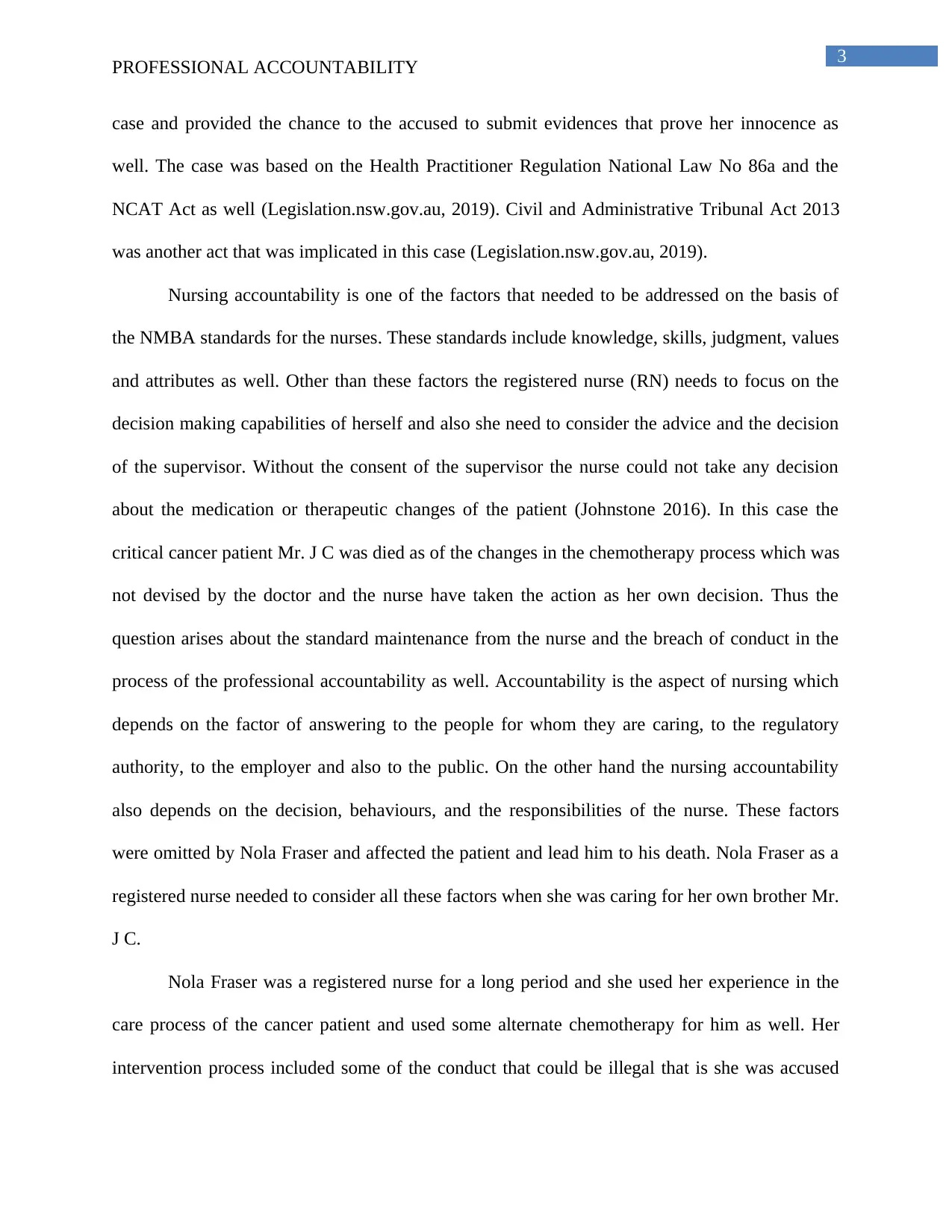
3
PROFESSIONAL ACCOUNTABILITY
case and provided the chance to the accused to submit evidences that prove her innocence as
well. The case was based on the Health Practitioner Regulation National Law No 86a and the
NCAT Act as well (Legislation.nsw.gov.au, 2019). Civil and Administrative Tribunal Act 2013
was another act that was implicated in this case (Legislation.nsw.gov.au, 2019).
Nursing accountability is one of the factors that needed to be addressed on the basis of
the NMBA standards for the nurses. These standards include knowledge, skills, judgment, values
and attributes as well. Other than these factors the registered nurse (RN) needs to focus on the
decision making capabilities of herself and also she need to consider the advice and the decision
of the supervisor. Without the consent of the supervisor the nurse could not take any decision
about the medication or therapeutic changes of the patient (Johnstone 2016). In this case the
critical cancer patient Mr. J C was died as of the changes in the chemotherapy process which was
not devised by the doctor and the nurse have taken the action as her own decision. Thus the
question arises about the standard maintenance from the nurse and the breach of conduct in the
process of the professional accountability as well. Accountability is the aspect of nursing which
depends on the factor of answering to the people for whom they are caring, to the regulatory
authority, to the employer and also to the public. On the other hand the nursing accountability
also depends on the decision, behaviours, and the responsibilities of the nurse. These factors
were omitted by Nola Fraser and affected the patient and lead him to his death. Nola Fraser as a
registered nurse needed to consider all these factors when she was caring for her own brother Mr.
J C.
Nola Fraser was a registered nurse for a long period and she used her experience in the
care process of the cancer patient and used some alternate chemotherapy for him as well. Her
intervention process included some of the conduct that could be illegal that is she was accused
PROFESSIONAL ACCOUNTABILITY
case and provided the chance to the accused to submit evidences that prove her innocence as
well. The case was based on the Health Practitioner Regulation National Law No 86a and the
NCAT Act as well (Legislation.nsw.gov.au, 2019). Civil and Administrative Tribunal Act 2013
was another act that was implicated in this case (Legislation.nsw.gov.au, 2019).
Nursing accountability is one of the factors that needed to be addressed on the basis of
the NMBA standards for the nurses. These standards include knowledge, skills, judgment, values
and attributes as well. Other than these factors the registered nurse (RN) needs to focus on the
decision making capabilities of herself and also she need to consider the advice and the decision
of the supervisor. Without the consent of the supervisor the nurse could not take any decision
about the medication or therapeutic changes of the patient (Johnstone 2016). In this case the
critical cancer patient Mr. J C was died as of the changes in the chemotherapy process which was
not devised by the doctor and the nurse have taken the action as her own decision. Thus the
question arises about the standard maintenance from the nurse and the breach of conduct in the
process of the professional accountability as well. Accountability is the aspect of nursing which
depends on the factor of answering to the people for whom they are caring, to the regulatory
authority, to the employer and also to the public. On the other hand the nursing accountability
also depends on the decision, behaviours, and the responsibilities of the nurse. These factors
were omitted by Nola Fraser and affected the patient and lead him to his death. Nola Fraser as a
registered nurse needed to consider all these factors when she was caring for her own brother Mr.
J C.
Nola Fraser was a registered nurse for a long period and she used her experience in the
care process of the cancer patient and used some alternate chemotherapy for him as well. Her
intervention process included some of the conduct that could be illegal that is she was accused
Paraphrase This Document
Need a fresh take? Get an instant paraphrase of this document with our AI Paraphraser
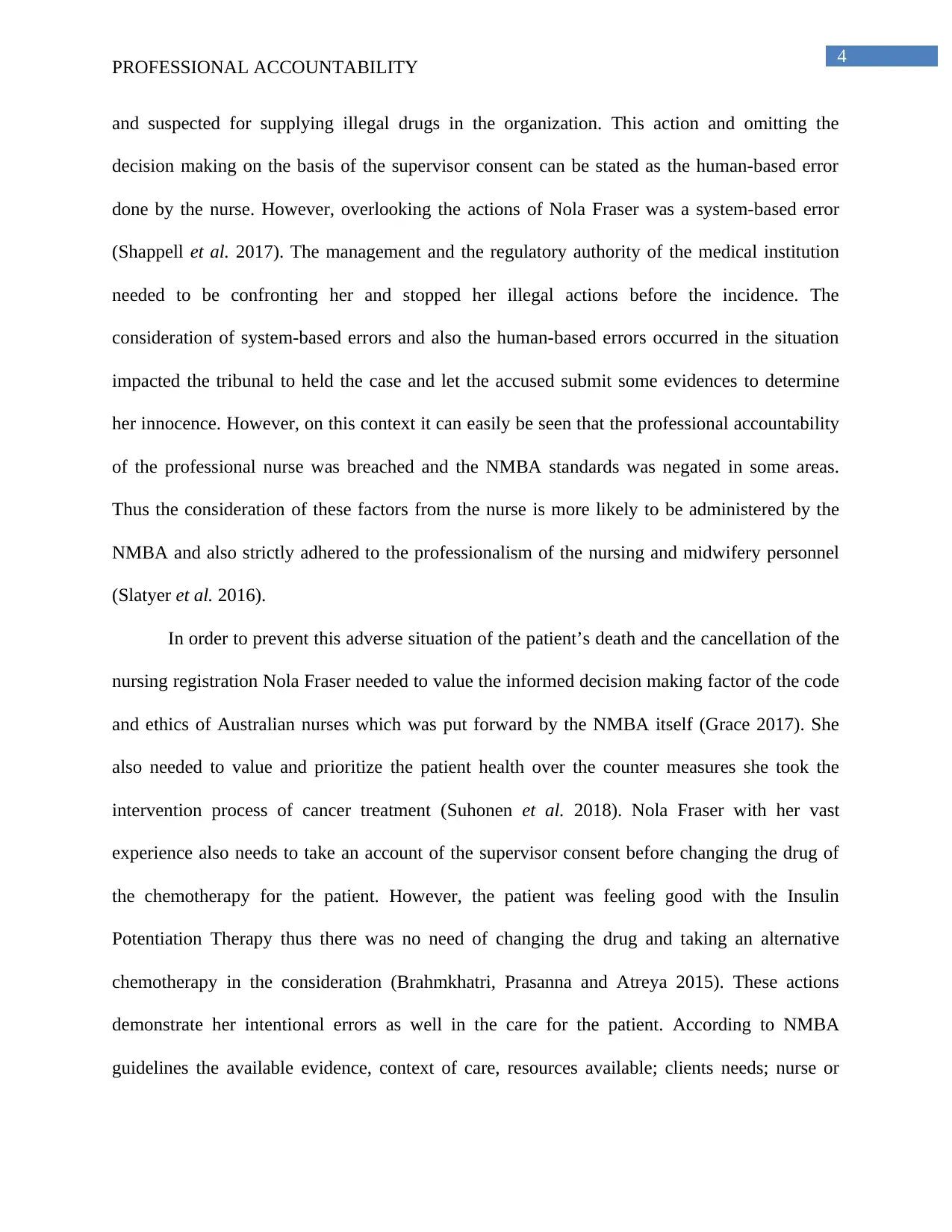
4
PROFESSIONAL ACCOUNTABILITY
and suspected for supplying illegal drugs in the organization. This action and omitting the
decision making on the basis of the supervisor consent can be stated as the human-based error
done by the nurse. However, overlooking the actions of Nola Fraser was a system-based error
(Shappell et al. 2017). The management and the regulatory authority of the medical institution
needed to be confronting her and stopped her illegal actions before the incidence. The
consideration of system-based errors and also the human-based errors occurred in the situation
impacted the tribunal to held the case and let the accused submit some evidences to determine
her innocence. However, on this context it can easily be seen that the professional accountability
of the professional nurse was breached and the NMBA standards was negated in some areas.
Thus the consideration of these factors from the nurse is more likely to be administered by the
NMBA and also strictly adhered to the professionalism of the nursing and midwifery personnel
(Slatyer et al. 2016).
In order to prevent this adverse situation of the patient’s death and the cancellation of the
nursing registration Nola Fraser needed to value the informed decision making factor of the code
and ethics of Australian nurses which was put forward by the NMBA itself (Grace 2017). She
also needed to value and prioritize the patient health over the counter measures she took the
intervention process of cancer treatment (Suhonen et al. 2018). Nola Fraser with her vast
experience also needs to take an account of the supervisor consent before changing the drug of
the chemotherapy for the patient. However, the patient was feeling good with the Insulin
Potentiation Therapy thus there was no need of changing the drug and taking an alternative
chemotherapy in the consideration (Brahmkhatri, Prasanna and Atreya 2015). These actions
demonstrate her intentional errors as well in the care for the patient. According to NMBA
guidelines the available evidence, context of care, resources available; clients needs; nurse or
PROFESSIONAL ACCOUNTABILITY
and suspected for supplying illegal drugs in the organization. This action and omitting the
decision making on the basis of the supervisor consent can be stated as the human-based error
done by the nurse. However, overlooking the actions of Nola Fraser was a system-based error
(Shappell et al. 2017). The management and the regulatory authority of the medical institution
needed to be confronting her and stopped her illegal actions before the incidence. The
consideration of system-based errors and also the human-based errors occurred in the situation
impacted the tribunal to held the case and let the accused submit some evidences to determine
her innocence. However, on this context it can easily be seen that the professional accountability
of the professional nurse was breached and the NMBA standards was negated in some areas.
Thus the consideration of these factors from the nurse is more likely to be administered by the
NMBA and also strictly adhered to the professionalism of the nursing and midwifery personnel
(Slatyer et al. 2016).
In order to prevent this adverse situation of the patient’s death and the cancellation of the
nursing registration Nola Fraser needed to value the informed decision making factor of the code
and ethics of Australian nurses which was put forward by the NMBA itself (Grace 2017). She
also needed to value and prioritize the patient health over the counter measures she took the
intervention process of cancer treatment (Suhonen et al. 2018). Nola Fraser with her vast
experience also needs to take an account of the supervisor consent before changing the drug of
the chemotherapy for the patient. However, the patient was feeling good with the Insulin
Potentiation Therapy thus there was no need of changing the drug and taking an alternative
chemotherapy in the consideration (Brahmkhatri, Prasanna and Atreya 2015). These actions
demonstrate her intentional errors as well in the care for the patient. According to NMBA
guidelines the available evidence, context of care, resources available; clients needs; nurse or
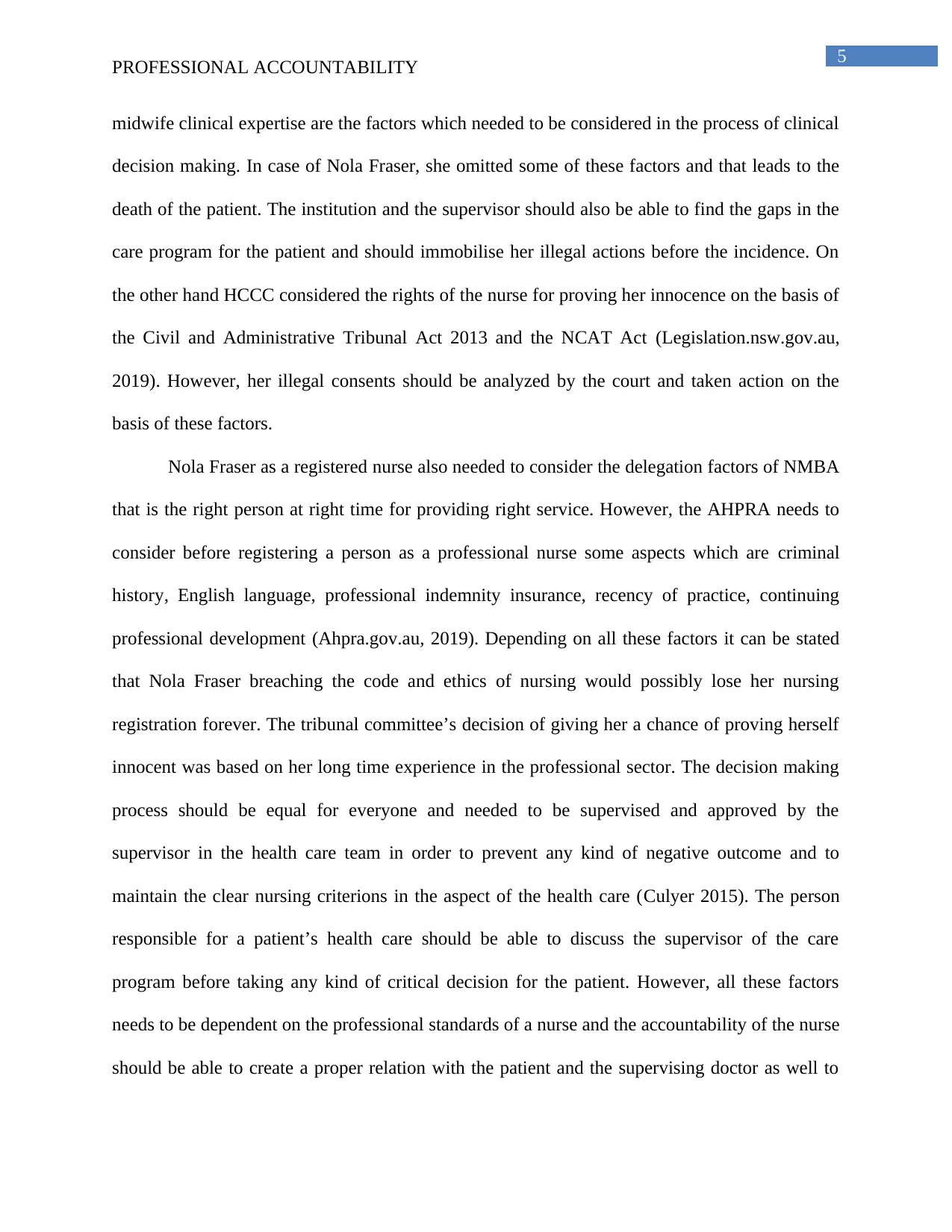
5
PROFESSIONAL ACCOUNTABILITY
midwife clinical expertise are the factors which needed to be considered in the process of clinical
decision making. In case of Nola Fraser, she omitted some of these factors and that leads to the
death of the patient. The institution and the supervisor should also be able to find the gaps in the
care program for the patient and should immobilise her illegal actions before the incidence. On
the other hand HCCC considered the rights of the nurse for proving her innocence on the basis of
the Civil and Administrative Tribunal Act 2013 and the NCAT Act (Legislation.nsw.gov.au,
2019). However, her illegal consents should be analyzed by the court and taken action on the
basis of these factors.
Nola Fraser as a registered nurse also needed to consider the delegation factors of NMBA
that is the right person at right time for providing right service. However, the AHPRA needs to
consider before registering a person as a professional nurse some aspects which are criminal
history, English language, professional indemnity insurance, recency of practice, continuing
professional development (Ahpra.gov.au, 2019). Depending on all these factors it can be stated
that Nola Fraser breaching the code and ethics of nursing would possibly lose her nursing
registration forever. The tribunal committee’s decision of giving her a chance of proving herself
innocent was based on her long time experience in the professional sector. The decision making
process should be equal for everyone and needed to be supervised and approved by the
supervisor in the health care team in order to prevent any kind of negative outcome and to
maintain the clear nursing criterions in the aspect of the health care (Culyer 2015). The person
responsible for a patient’s health care should be able to discuss the supervisor of the care
program before taking any kind of critical decision for the patient. However, all these factors
needs to be dependent on the professional standards of a nurse and the accountability of the nurse
should be able to create a proper relation with the patient and the supervising doctor as well to
PROFESSIONAL ACCOUNTABILITY
midwife clinical expertise are the factors which needed to be considered in the process of clinical
decision making. In case of Nola Fraser, she omitted some of these factors and that leads to the
death of the patient. The institution and the supervisor should also be able to find the gaps in the
care program for the patient and should immobilise her illegal actions before the incidence. On
the other hand HCCC considered the rights of the nurse for proving her innocence on the basis of
the Civil and Administrative Tribunal Act 2013 and the NCAT Act (Legislation.nsw.gov.au,
2019). However, her illegal consents should be analyzed by the court and taken action on the
basis of these factors.
Nola Fraser as a registered nurse also needed to consider the delegation factors of NMBA
that is the right person at right time for providing right service. However, the AHPRA needs to
consider before registering a person as a professional nurse some aspects which are criminal
history, English language, professional indemnity insurance, recency of practice, continuing
professional development (Ahpra.gov.au, 2019). Depending on all these factors it can be stated
that Nola Fraser breaching the code and ethics of nursing would possibly lose her nursing
registration forever. The tribunal committee’s decision of giving her a chance of proving herself
innocent was based on her long time experience in the professional sector. The decision making
process should be equal for everyone and needed to be supervised and approved by the
supervisor in the health care team in order to prevent any kind of negative outcome and to
maintain the clear nursing criterions in the aspect of the health care (Culyer 2015). The person
responsible for a patient’s health care should be able to discuss the supervisor of the care
program before taking any kind of critical decision for the patient. However, all these factors
needs to be dependent on the professional standards of a nurse and the accountability of the nurse
should be able to create a proper relation with the patient and the supervising doctor as well to
⊘ This is a preview!⊘
Do you want full access?
Subscribe today to unlock all pages.

Trusted by 1+ million students worldwide
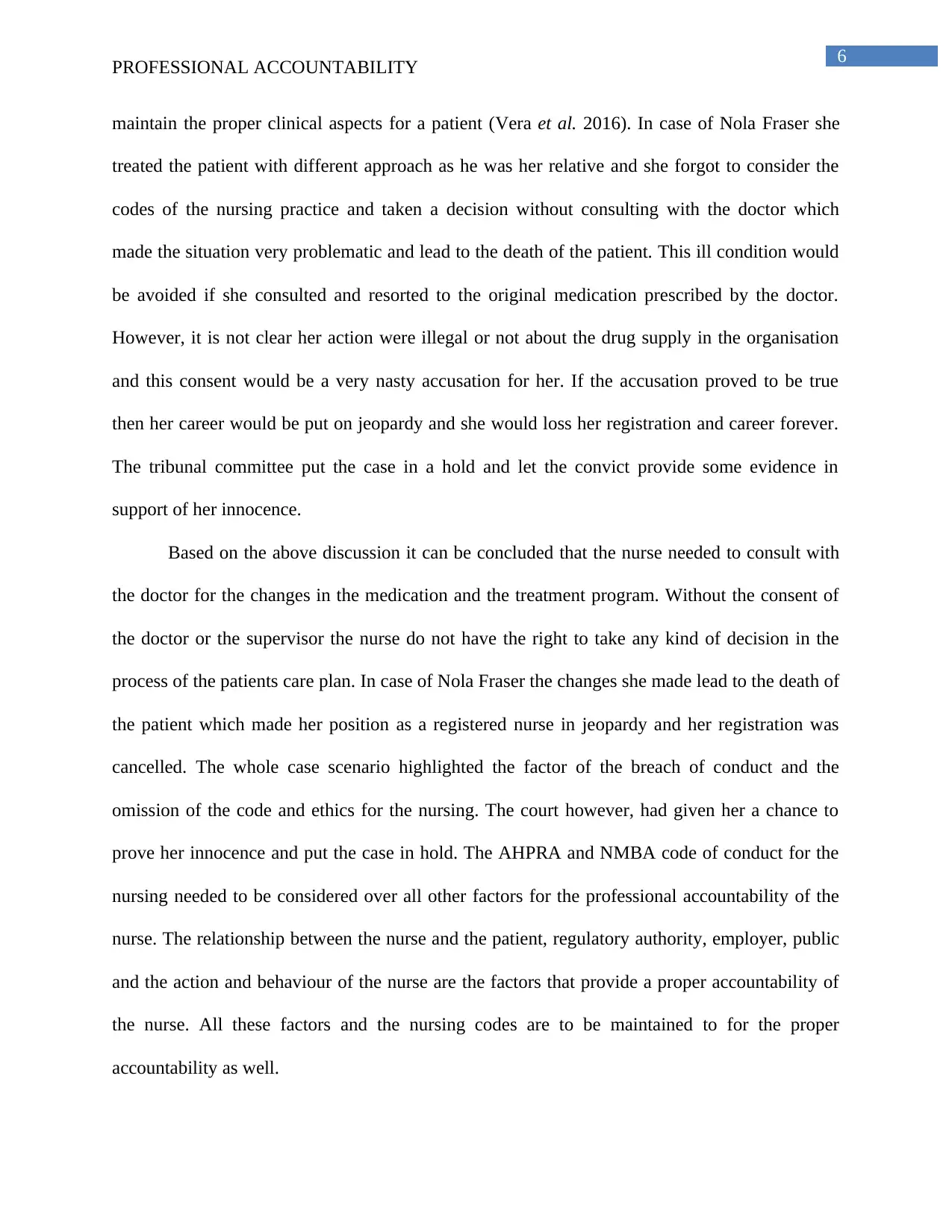
6
PROFESSIONAL ACCOUNTABILITY
maintain the proper clinical aspects for a patient (Vera et al. 2016). In case of Nola Fraser she
treated the patient with different approach as he was her relative and she forgot to consider the
codes of the nursing practice and taken a decision without consulting with the doctor which
made the situation very problematic and lead to the death of the patient. This ill condition would
be avoided if she consulted and resorted to the original medication prescribed by the doctor.
However, it is not clear her action were illegal or not about the drug supply in the organisation
and this consent would be a very nasty accusation for her. If the accusation proved to be true
then her career would be put on jeopardy and she would loss her registration and career forever.
The tribunal committee put the case in a hold and let the convict provide some evidence in
support of her innocence.
Based on the above discussion it can be concluded that the nurse needed to consult with
the doctor for the changes in the medication and the treatment program. Without the consent of
the doctor or the supervisor the nurse do not have the right to take any kind of decision in the
process of the patients care plan. In case of Nola Fraser the changes she made lead to the death of
the patient which made her position as a registered nurse in jeopardy and her registration was
cancelled. The whole case scenario highlighted the factor of the breach of conduct and the
omission of the code and ethics for the nursing. The court however, had given her a chance to
prove her innocence and put the case in hold. The AHPRA and NMBA code of conduct for the
nursing needed to be considered over all other factors for the professional accountability of the
nurse. The relationship between the nurse and the patient, regulatory authority, employer, public
and the action and behaviour of the nurse are the factors that provide a proper accountability of
the nurse. All these factors and the nursing codes are to be maintained to for the proper
accountability as well.
PROFESSIONAL ACCOUNTABILITY
maintain the proper clinical aspects for a patient (Vera et al. 2016). In case of Nola Fraser she
treated the patient with different approach as he was her relative and she forgot to consider the
codes of the nursing practice and taken a decision without consulting with the doctor which
made the situation very problematic and lead to the death of the patient. This ill condition would
be avoided if she consulted and resorted to the original medication prescribed by the doctor.
However, it is not clear her action were illegal or not about the drug supply in the organisation
and this consent would be a very nasty accusation for her. If the accusation proved to be true
then her career would be put on jeopardy and she would loss her registration and career forever.
The tribunal committee put the case in a hold and let the convict provide some evidence in
support of her innocence.
Based on the above discussion it can be concluded that the nurse needed to consult with
the doctor for the changes in the medication and the treatment program. Without the consent of
the doctor or the supervisor the nurse do not have the right to take any kind of decision in the
process of the patients care plan. In case of Nola Fraser the changes she made lead to the death of
the patient which made her position as a registered nurse in jeopardy and her registration was
cancelled. The whole case scenario highlighted the factor of the breach of conduct and the
omission of the code and ethics for the nursing. The court however, had given her a chance to
prove her innocence and put the case in hold. The AHPRA and NMBA code of conduct for the
nursing needed to be considered over all other factors for the professional accountability of the
nurse. The relationship between the nurse and the patient, regulatory authority, employer, public
and the action and behaviour of the nurse are the factors that provide a proper accountability of
the nurse. All these factors and the nursing codes are to be maintained to for the proper
accountability as well.
Paraphrase This Document
Need a fresh take? Get an instant paraphrase of this document with our AI Paraphraser
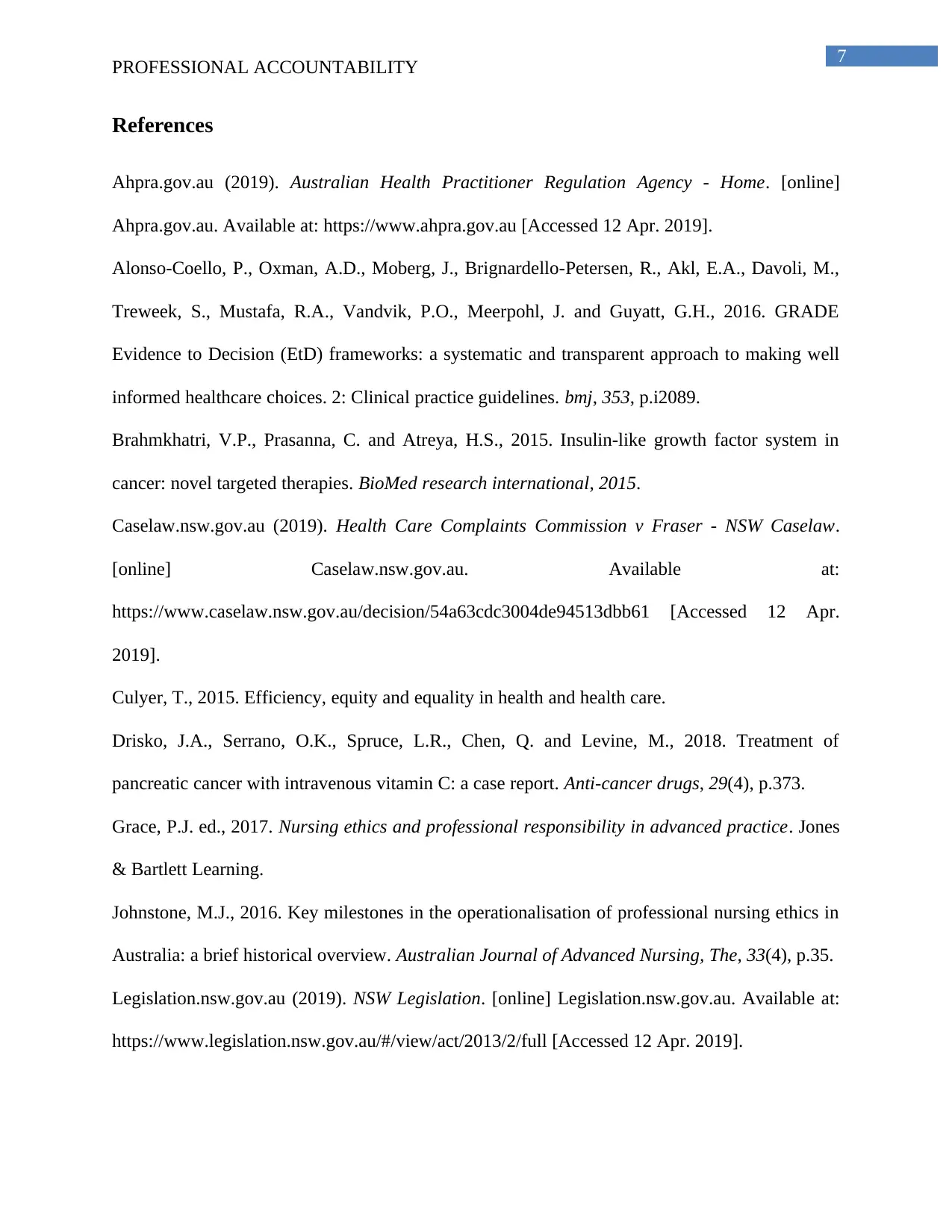
7
PROFESSIONAL ACCOUNTABILITY
References
Ahpra.gov.au (2019). Australian Health Practitioner Regulation Agency - Home. [online]
Ahpra.gov.au. Available at: https://www.ahpra.gov.au [Accessed 12 Apr. 2019].
Alonso-Coello, P., Oxman, A.D., Moberg, J., Brignardello-Petersen, R., Akl, E.A., Davoli, M.,
Treweek, S., Mustafa, R.A., Vandvik, P.O., Meerpohl, J. and Guyatt, G.H., 2016. GRADE
Evidence to Decision (EtD) frameworks: a systematic and transparent approach to making well
informed healthcare choices. 2: Clinical practice guidelines. bmj, 353, p.i2089.
Brahmkhatri, V.P., Prasanna, C. and Atreya, H.S., 2015. Insulin-like growth factor system in
cancer: novel targeted therapies. BioMed research international, 2015.
Caselaw.nsw.gov.au (2019). Health Care Complaints Commission v Fraser - NSW Caselaw.
[online] Caselaw.nsw.gov.au. Available at:
https://www.caselaw.nsw.gov.au/decision/54a63cdc3004de94513dbb61 [Accessed 12 Apr.
2019].
Culyer, T., 2015. Efficiency, equity and equality in health and health care.
Drisko, J.A., Serrano, O.K., Spruce, L.R., Chen, Q. and Levine, M., 2018. Treatment of
pancreatic cancer with intravenous vitamin C: a case report. Anti-cancer drugs, 29(4), p.373.
Grace, P.J. ed., 2017. Nursing ethics and professional responsibility in advanced practice. Jones
& Bartlett Learning.
Johnstone, M.J., 2016. Key milestones in the operationalisation of professional nursing ethics in
Australia: a brief historical overview. Australian Journal of Advanced Nursing, The, 33(4), p.35.
Legislation.nsw.gov.au (2019). NSW Legislation. [online] Legislation.nsw.gov.au. Available at:
https://www.legislation.nsw.gov.au/#/view/act/2013/2/full [Accessed 12 Apr. 2019].
PROFESSIONAL ACCOUNTABILITY
References
Ahpra.gov.au (2019). Australian Health Practitioner Regulation Agency - Home. [online]
Ahpra.gov.au. Available at: https://www.ahpra.gov.au [Accessed 12 Apr. 2019].
Alonso-Coello, P., Oxman, A.D., Moberg, J., Brignardello-Petersen, R., Akl, E.A., Davoli, M.,
Treweek, S., Mustafa, R.A., Vandvik, P.O., Meerpohl, J. and Guyatt, G.H., 2016. GRADE
Evidence to Decision (EtD) frameworks: a systematic and transparent approach to making well
informed healthcare choices. 2: Clinical practice guidelines. bmj, 353, p.i2089.
Brahmkhatri, V.P., Prasanna, C. and Atreya, H.S., 2015. Insulin-like growth factor system in
cancer: novel targeted therapies. BioMed research international, 2015.
Caselaw.nsw.gov.au (2019). Health Care Complaints Commission v Fraser - NSW Caselaw.
[online] Caselaw.nsw.gov.au. Available at:
https://www.caselaw.nsw.gov.au/decision/54a63cdc3004de94513dbb61 [Accessed 12 Apr.
2019].
Culyer, T., 2015. Efficiency, equity and equality in health and health care.
Drisko, J.A., Serrano, O.K., Spruce, L.R., Chen, Q. and Levine, M., 2018. Treatment of
pancreatic cancer with intravenous vitamin C: a case report. Anti-cancer drugs, 29(4), p.373.
Grace, P.J. ed., 2017. Nursing ethics and professional responsibility in advanced practice. Jones
& Bartlett Learning.
Johnstone, M.J., 2016. Key milestones in the operationalisation of professional nursing ethics in
Australia: a brief historical overview. Australian Journal of Advanced Nursing, The, 33(4), p.35.
Legislation.nsw.gov.au (2019). NSW Legislation. [online] Legislation.nsw.gov.au. Available at:
https://www.legislation.nsw.gov.au/#/view/act/2013/2/full [Accessed 12 Apr. 2019].
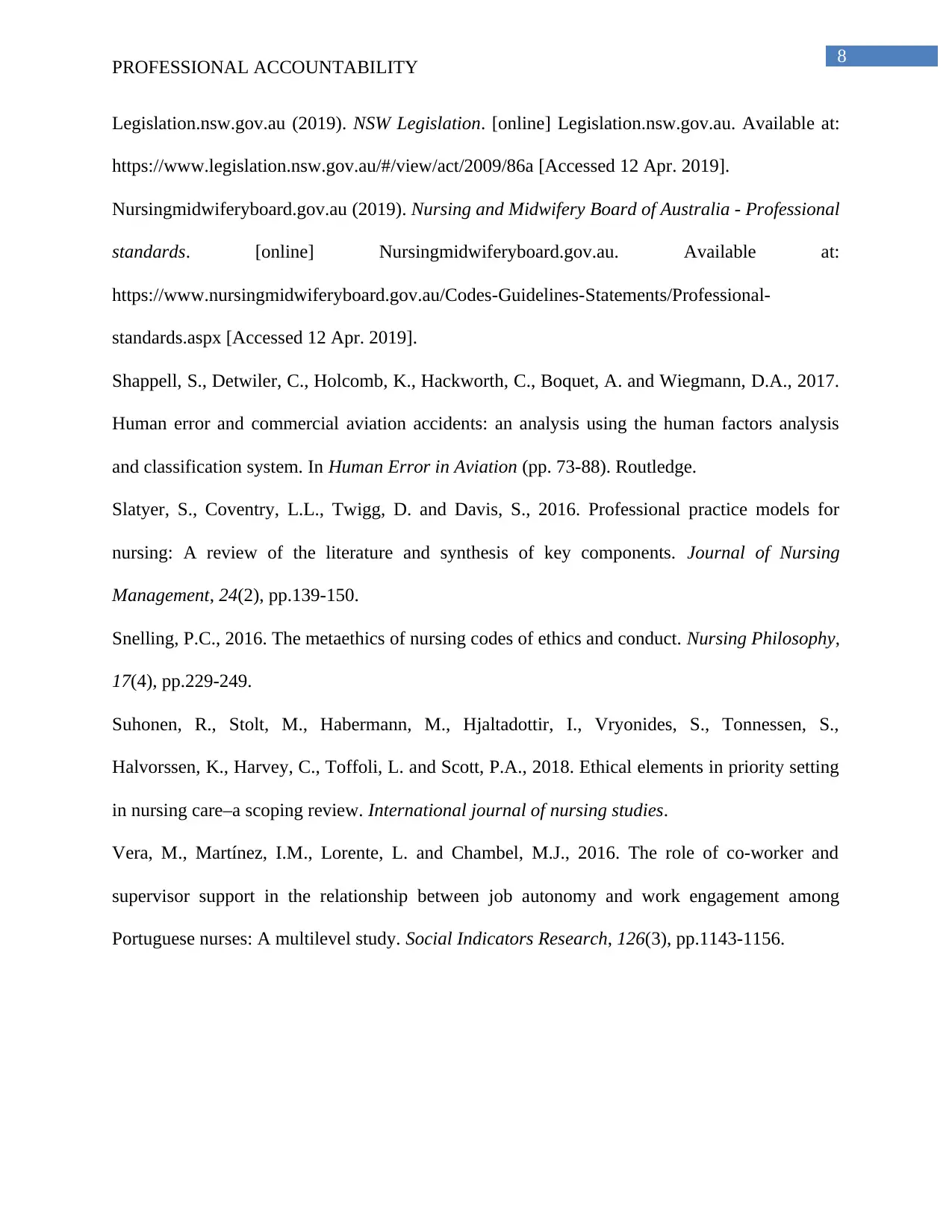
8
PROFESSIONAL ACCOUNTABILITY
Legislation.nsw.gov.au (2019). NSW Legislation. [online] Legislation.nsw.gov.au. Available at:
https://www.legislation.nsw.gov.au/#/view/act/2009/86a [Accessed 12 Apr. 2019].
Nursingmidwiferyboard.gov.au (2019). Nursing and Midwifery Board of Australia - Professional
standards. [online] Nursingmidwiferyboard.gov.au. Available at:
https://www.nursingmidwiferyboard.gov.au/Codes-Guidelines-Statements/Professional-
standards.aspx [Accessed 12 Apr. 2019].
Shappell, S., Detwiler, C., Holcomb, K., Hackworth, C., Boquet, A. and Wiegmann, D.A., 2017.
Human error and commercial aviation accidents: an analysis using the human factors analysis
and classification system. In Human Error in Aviation (pp. 73-88). Routledge.
Slatyer, S., Coventry, L.L., Twigg, D. and Davis, S., 2016. Professional practice models for
nursing: A review of the literature and synthesis of key components. Journal of Nursing
Management, 24(2), pp.139-150.
Snelling, P.C., 2016. The metaethics of nursing codes of ethics and conduct. Nursing Philosophy,
17(4), pp.229-249.
Suhonen, R., Stolt, M., Habermann, M., Hjaltadottir, I., Vryonides, S., Tonnessen, S.,
Halvorssen, K., Harvey, C., Toffoli, L. and Scott, P.A., 2018. Ethical elements in priority setting
in nursing care–a scoping review. International journal of nursing studies.
Vera, M., Martínez, I.M., Lorente, L. and Chambel, M.J., 2016. The role of co-worker and
supervisor support in the relationship between job autonomy and work engagement among
Portuguese nurses: A multilevel study. Social Indicators Research, 126(3), pp.1143-1156.
PROFESSIONAL ACCOUNTABILITY
Legislation.nsw.gov.au (2019). NSW Legislation. [online] Legislation.nsw.gov.au. Available at:
https://www.legislation.nsw.gov.au/#/view/act/2009/86a [Accessed 12 Apr. 2019].
Nursingmidwiferyboard.gov.au (2019). Nursing and Midwifery Board of Australia - Professional
standards. [online] Nursingmidwiferyboard.gov.au. Available at:
https://www.nursingmidwiferyboard.gov.au/Codes-Guidelines-Statements/Professional-
standards.aspx [Accessed 12 Apr. 2019].
Shappell, S., Detwiler, C., Holcomb, K., Hackworth, C., Boquet, A. and Wiegmann, D.A., 2017.
Human error and commercial aviation accidents: an analysis using the human factors analysis
and classification system. In Human Error in Aviation (pp. 73-88). Routledge.
Slatyer, S., Coventry, L.L., Twigg, D. and Davis, S., 2016. Professional practice models for
nursing: A review of the literature and synthesis of key components. Journal of Nursing
Management, 24(2), pp.139-150.
Snelling, P.C., 2016. The metaethics of nursing codes of ethics and conduct. Nursing Philosophy,
17(4), pp.229-249.
Suhonen, R., Stolt, M., Habermann, M., Hjaltadottir, I., Vryonides, S., Tonnessen, S.,
Halvorssen, K., Harvey, C., Toffoli, L. and Scott, P.A., 2018. Ethical elements in priority setting
in nursing care–a scoping review. International journal of nursing studies.
Vera, M., Martínez, I.M., Lorente, L. and Chambel, M.J., 2016. The role of co-worker and
supervisor support in the relationship between job autonomy and work engagement among
Portuguese nurses: A multilevel study. Social Indicators Research, 126(3), pp.1143-1156.
⊘ This is a preview!⊘
Do you want full access?
Subscribe today to unlock all pages.

Trusted by 1+ million students worldwide
1 out of 9
Related Documents
Your All-in-One AI-Powered Toolkit for Academic Success.
+13062052269
info@desklib.com
Available 24*7 on WhatsApp / Email
![[object Object]](/_next/static/media/star-bottom.7253800d.svg)
Unlock your academic potential
Copyright © 2020–2026 A2Z Services. All Rights Reserved. Developed and managed by ZUCOL.




